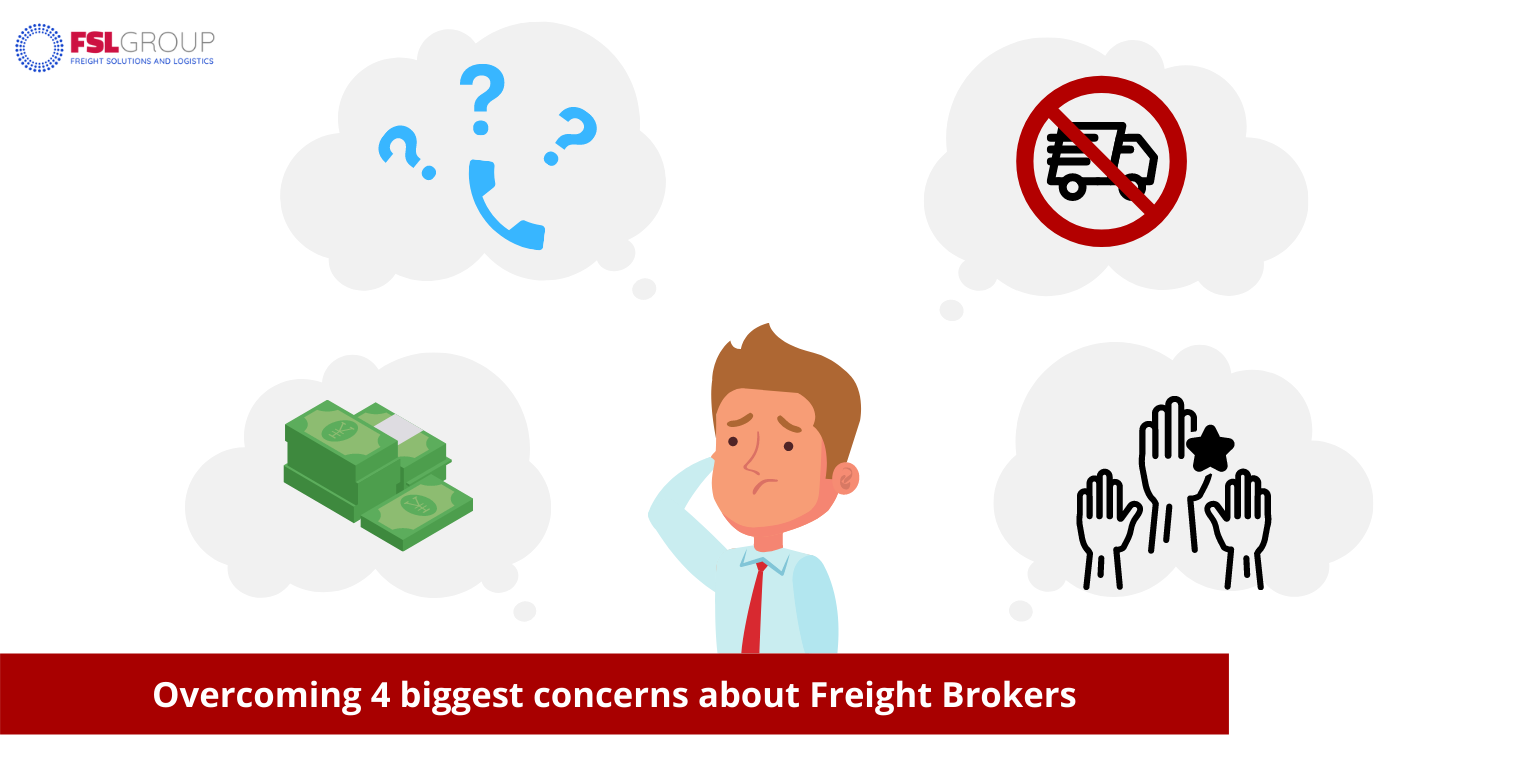Undeniably, freight brokers are known to have a bad reputation in the logistics industry for being too aggressive when pursuing new business. Many customers and carriers have even been burned by some bad apples. To avoid bad experiences from becoming a recurring theme, we will openly dissect top points of concern and provide tips on how to find the right broker that fits your needs. Before we get started, let’s discuss the role of a freight broker and how they can benefit your business. A freight broker is the middle man between a customer (the entity that has the freight) and the transportation carrier (the trucking company that hauls the freight). Freight brokers are responsible for a myriad of transportation related tasks. In simplest terms, they secure the truck and ensure successful delivery of goods. However, the process of logistics is much more complex than that. Freight brokers are responsible for scheduling appointments, optimizing route options, maintaining strong carrier partnerships, forecasting potential setbacks, troubleshooting actual setbacks, tracking and communicating transit and delivery status for the customer and so much more. Ultimately, a freight broker’s job is to alleviate the hassle of the logistics process to help customers save time and money.
So let’s get started: What are some of the biggest concerns regarding freight brokers?
They Overcharge
It’s true that brokers make their money from the difference in how much their customer pays them to ship their freight and how much money they pay their carrier to haul the freight. A broker can be incentivized to ask for as much money as possible, within reason, and to pay the carrier as fairly low as possible. With prices in the market increasing all around, there have been concerns about freight brokers charging high prices without explanation.
Keep in mind that there are multiple factors a freight broker must take into consideration when providing a quote that you may not have considered. For example, brokers do not come up with pricing randomly, rather they look at industry trends over the previous days/weeks/months. Supply and demand plays a huge role in pricing and is influenced by whether capacity in the specific area is loose (lots of available trucks) or tight (less available trucks). Additionally, time sensitivity, holidays, weather conditions, fuel, tolls, commodity, cargo value, and other special requirements are also factors that could impact the price of transportation. Over the past couple of years, we’ve seen freight costs fluctuate and sky rocket at a significant rate. Even contractually binding prices are reevaluated multiple times a year to keep up with market trends!
If you’re unsure about the price your freight broker is quoting you, it’s okay to ask! There should be a valid reason why the price is higher than you expected. Believe it or not, brokers are not always trying to pull one over on you. They simply want to make sure they have enough money in the load to attract quality service. The last thing a broker wants to do is ask for more money or give the load back and lose the business. However, if you ask and they are reluctant to give you an answer, that may be a red flag! It’s important to remember that truckload pricing is negotiable. Taking that extra step to simply ask for a lower rate will help save you money and strengthen the trust and relationship between you and the broker. When a broker provides a quote, they don’t necessarily have a truck in hand. There may be a bit of wiggle room in the price. And if there is no wiggle room left, they will let you know. Negotiation is the name of the game.
Too Many Breaks in Communication
Timely communication is crucial in the logistics industry. But let’s face it, when your customer wants an immediate update, it can take a freight broker some time to gather the information you need. Freight brokers are the middle men. In order to get an update, the broker has to contact the carrier dispatcher. Dispatcher then contacts the driver hauling the load to get an update. The dispatcher then delivers the update to the broker, who can now finally update the customer. Sometimes this will cause delays in communication especially if all other parties involved in the shipping process are not as urgent. Sometimes they’ll find themselves in a game of telephone or in a double brokering scheme. Double brokering is the re-brokering of a load to another broker who books the actual carrier on the load without authorization.
A freight broker’s job is to alleviate the headache associated with communicating with carriers. The best brokers will provide you with proactive updates before being asked to do so. A knowledgeable freight broker will ask all the right questions prior to shipping to entirely understand all of the requirements and ensure that your precious cargo is transported safely. For example, they would ask for shipper and receiver contact information in order to appropriately schedule the pick-up and/or delivery appointments. If your current freight broker is not strong and timely in communication, it’s probably about time to take out the rolodex of contact names you keep in the bottom drawer and pick another one. You don’t have to settle!
Try looking for a freight broker from a smaller brokerage company because they are more likely to select carriers they trust and have good communication with. Larger brokerage firms might highlight their pool of thousands of carriers as a major selling point but having a tight list of exceptional and dependable carriers is better than a big sum of subpar carriers. A freight broker working for a smaller brokerage is more likely to select a carrier based on performance and pay a little extra money for the better service to get more recurring business from their customer. These brokers will also take the time to dig into any issues and provide more reliable updates as the single point of contact for the customer. No one wants to call in for an update and be transferred to three separate people for assistance and having to explain the reason for the call each time. Smaller brokerages are far superior in this customer service element. You’ll find that the best brokers will work around the clock to ensure your freight is being looked after while you’re off the clock.
Capacity is never “guaranteed”
Post pandemic freight market has been unpredictable to say the least. With the shortage of truck drivers and soaring gas prices, transportation costs are at an all time high. Even paying over $10,000 for a truck from California to New Jersey sometimes is not enough money to secure a trusted carrier option. The truth is that capacity everywhere is significantly more limited than it was pre-pandemic. When a freight broker sends a quote on a load, it’s fair to assume they probably don’t have a truck in hand. They are quoting based on what they are expecting to pay for a truck. However, when the time comes to find the truck, there is no telling how the market will react.
To combat this issue, customers should allow ample time to secure a truck. Keep in mind that carriers don’t sit around and wait for your load to just show up. They have to keep their wheels moving and often, the most reliable carriers book their loads days or even weeks in advance. Last minute loads may end up costing more money because capacity becomes limited as time passes throughout the day. Plan ahead, book in advance, and secure the capacity early!
One of the most overlooked factors that causes capacity issues is customers shopping around for better pricing. While you may think you’re being economical by asking 5 different brokers to find you a truck for the cheapest rate, you’re actually driving the market prices up. These brokers are posting your load on the same load boards and looking for options in the same pool of carriers. Though you have only one load, for carriers it appears that there are 5 loads available. This causes the market to look off-balanced and the carriers quote higher because it appears that the market is tighter than it actually is. On top of that, each broker is spending their time and energy fighting for a load that can be pulled away from them at any moment. Pick a good broker, stick to them, and don’t pass your load around.
Accountability Issues
It is logistics afterall and problems are inevitable in this industry. When an issue arises, does your broker fight or fleet? Do they quickly put the blame on someone or something else other than themselves? While there may be other factors that may cause a delay or an issue with a load, the best brokers take true accountability. They may not have caused that traffic jam on I-75 that caused the driver to arrive 30 minutes after their pick-up time, but did the broker give you an updated ETA immediately when the truck was running behind? Or did you have to ask them where the truck is after they didn’t show up on time?
These are the things that truly separate a good broker from a mediocre one. There are brokers out there that won’t answer the phone when there’s an issue. Communication is the key to accountability. Good brokers know when to communicate issues and are proactive with updates and solutions to any problems. The best brokers recognize a potential issue before it occurs and take steps to mitigate it. It’s important to remember that brokers are human and can make mistakes, even the good ones. However, it’s the reaction or accountability to the issue that matters. Always remember to take a step back and assess the situation to determine if the broker is truly at fault or could have done something to help prevent the issue. If too often you find your broker making excuses or putting blame on someone else, then it’s probably time for a change. Though there are certainly external factors that may cause an issue, like weather or traffic, there are times that issues are a result of poor carrier performance. If the blame immediately goes to the carrier, keep in mind that the broker is the one who selected the carrier.
We’re here to tell you that you’re not alone in the concerns about freight brokers. Being overcharged, dealing with bad communication, capacity issues, and lack of accountability from brokers are all understandable and sometimes even legitimate concerns to have. However, by selecting the right freight broker, you can ultimately strengthen your logistics process. The GOOD APPLE is out there for you and by using the tips we provided for you here, you are only steps away from finding the freight broker your business deserves.


